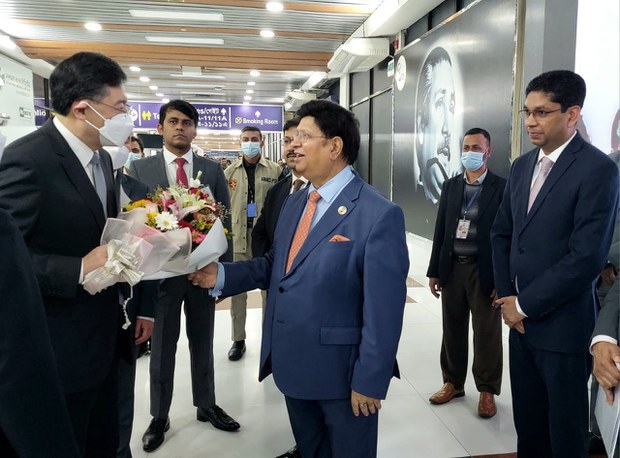FM: Bangladesh wants good ties with US, China but it’s a challenge
Share

Bangladesh Foreign Minister A. K. Abdul Momen (center) welcomes Qin Gang, China’s new foreign minister, during a stop-over at Dhaka International Airport, Jan. 10, 2023.
Dhaka wants good relations with both Beijing and Washington but striking a balance between the two superpowers is a challenge, Bangladesh’s foreign minister said Tuesday after meeting new Chinese Foreign Minister Qin Gang.
China’s top diplomat was making a stopover at Dhaka’s international airport as he headed to Africa for his first official trip in his new position. His brief visit took place amid tensions between Washington and Beijing – rival powers competing for influence in Asia.
When asked about Bangladesh foreign policy in such a situation, Foreign Minister A. K. Abdul Momen said the country’s position had not changed.
“They might have their own issues. That is their headache, not ours,” Momen said, referring to China and the United States.
“Bangladesh wants to maintain good relations with both of them. That is a challenging thing,” Momen said.
Bilateral tensions have arisen lately between Washington and Dhaka after the U.S. sanctioned an elite Bangladeshi security unit over human rights concerns. Sino-Bangladeshi tensions have also surfaced.
“We believe in the one-China principle. We maintain a balanced foreign policy. This is our principle. We will extend our support [to China] from time to time.”
The Chinese minister did not talk to the media but the Chinese embassy in Dhaka posted a statement on its website.
“The two sides spoke highly of the friendship between China and Bangladesh, and agreed to strengthen exchanges in the new year and jointly work for new progress in bilateral relations,” the statement said.
Qin, 56, who most recently served as Beijing’s ambassador to Washington, replaced Wang Yi, who had been China’s top diplomat for a decade.
Qin’s airport layover in Bangladesh came as the U.S. National Security Council’s Senior Director for South Asia, Rear Adm. Eileen Laubacher, visited the country. U.S. Assistant Secretary of State Donald Lu is also scheduled to visit Bangladesh on Jan. 14.
China and the U.S. are vying for influence in the small non-aligned South Asian nation, which is bordered by the Bay of Bengal to its south.
Bangladesh is, in fact, caught in the middle of a geopolitical battle between the two superpowers for supremacy in the Indo-Pacific region, analysts say. At the height of the COVID-19 pandemic, Bangladesh was one of the targets of the superpowers’ vaccine diplomacy for this reason.
Being sought after, though, can be a “challenge,” as Momen put it, because Bangladesh needs both China and the U.S. for its economic development and has to balance its relationships with them. As it is, Dhaka walks a tightrope between New Delhi and Beijing, which are staunch foes.
The U.S. is a key recipient of Bangladesh’s exports, and the South Asian nation is looking to China to ramp up its infrastructure under Beijing’s Belt and Road Initiative.
Since December 2021, Dhaka’s relationship with Washington has been fraught after the U.S. declared sanctions on Bangladesh’s elite security force, the Rapid Action Battalion, over alleged human rights violations such as enforced disappearances.
Tensions spilled over into 2022 and this year.
On Monday, Bangladesh’s Momen archly commented that his country did not need lessons on democracy from other nations, after the U.S. called on Dhaka to ensure that upcoming elections be free, fair and transparent.
“This country was born to establish democracy, human rights and justice. We fought for human rights. Every citizen has these ideals in their veins,” Momen said when asked about recent related comments from the U.S. State Department spokesman.
“We don’t need to be advised by others. Let them look in the mirror,” he added.
On Tuesday, Momen was asked if U.S. Rear Adm. Laubacher had discussed Bangladesh’s upcoming general election, but he didn’t give a direct answer. He merely said that the last national polls were free and fair.
“It will be unfortunate if any violence occurs during the elections and it cannot be stopped by outside suggestions. We have to do it,” he said.
Dhaka has seen tensions with Beijing as well.
In May 2021, China’s then-envoy to Bangladesh said that the relationship between the two countries could be “substantially damaged” if the South Asian country joined any initiative launched by the Washington-led Quad alliance.
The Quad, or the Quadrilateral Security Dialogue on the Indo-Pacific region, comprises the United States, Japan, Australia and India.
Bangladesh hit back saying it was a sovereign state and would make its own decisions about the nation’s foreign policy. At the time, Momen called the Chinese envoy’s comments “aggressive.”
BenarNews is an RFA-affiliated news service







